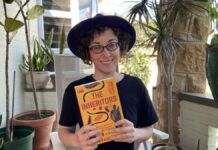I am not one to write open letters, but I am enraged. I am very tired but unfortunately for “racist cishetero patriarchal Christian torture” not tired enough (yet) to take action. I am tired of the University of Cape Town (UCT), particularly the Faculty of Health Sciences, taking ethically weak stances on issues that they are meant to be at the forefront of advocating for, writes TEMWA-DANGO MWAMBENE.
I have been at UCT for four years and I remember the then vice-chancellor Dr Max Price welcoming us on the first year MBChB registration day and speaking about how UCT is a place for rigorous academic debate and contrasting views and as an example invited us to participate in the upcoming ‘Israeli-Apartheid’ week. A week, if UCT had any ethical integrity, that should rather be dedicated to collective initiatives around awareness and actions in support of the Palestinian liberation struggle. But this open letter is not about UCT’s inability to take a pro-Palestine position but about abortions.
Abortions are life-altering, medical interventions that are exercises in upholding bodily autonomy to people with uteruses who choose to terminate their pregnancies. Abortions, existing in various legal contexts, are one of the most pervasive health needs globally and date back to time immemorial. One in three people with uteruses have abortions: it is a very common procedure. There is plenty of evidence demonstrating that abortions are one of the safest medical procedures ever; countries that have legalised abortions see dramatic decreases in deaths due to complications from illegal abortions. In 1994*, complications from unsafe abortion led to 32.69 deaths per 1,000 abortions in South Africa. By 1998**, since the enactment of the Choice on Termination of Pregnancy Act, 1996 (Act no. 92 of 1996), only 0.80 deaths per 1,000 were reported and this number remained steady or dropped in subsequent years. Furthermore, as compared to 1994, there was a 91% drop in deaths related to unsafe abortion in the 1998-2001 period. By the 2005-2007 period, annual abortion-related deaths accounted for only 3.3% of all maternal deaths.
South Africa’s Choice on Termination of Pregnancy Act (CTOPA) is one of the most radical and well-reasoned abortion laws in the world that allows abortion on demand up to the twelfth week of pregnancy, under broadly specified circumstances from the thirteenth to the twentieth week, and only for serious medical reasons after the twentieth week. Despite this progressive law many people in this country resort to accessing illegal unsafe abortions because of stigma, conscientious objection by healthcare providers, poor healthcare infrastructure and availability as well as lack of comprehensive sexual and reproductive health information which act as huge barriers. Illegal abortions still outnumber legal abortions with more than 50% occurring in the informal sector and currently an estimated 9.5% of South Africa’s maternal deaths are due to unsafe abortion procedures, an increase from 2005-2007.
Conscientious objection, which is an old military term, is defined by The Hastings Center as the refusal to perform a legal role or responsibility because of one’s personal beliefs and in healthcare it can involve healthcare professionals not providing certain treatments to their patients and parents not consenting to certain treatments for their children. Citing moral and/or religious reasons many healthcare professionals refuse to perform or in other ways participate in abortions, some pharmacists will not fill prescriptions for abortion medication or even stock the emergency contraceptive pill.
Globally there is a shift to move away from the language around conscientious objection with regards to abortions to “refusal to treat/care” and in South Africa, in line with our abortion law which notes to “obstruction to access”. According to the World Health Organisation conscientious objection without referrals is a major barrier to people accessing abortions as there usually is a lack of clear policy guidelines and the practice is often unregulated and applied incorrectly decreasing the number of facilities that can offer safe abortion services. In 2017 fifty experts from twenty countries and diverse professional backgrounds convened for the first ever international meeting on conscientious objection to abortion and highlighted that conscientious objection is not supported by human rights frameworks and forces people to make undignified choices around their reproductive health.
It is extremely disappointing and disgusting how a university that claims to be a progressive institution continually allows violent anti-choice groups like “Students for Life” to take up space on its campuses. UCT Health Sciences faculty claims to be committed to transformation and to our constitutional provisions of the right to access to health including reproductive health but take no firm stances in our teaching to prioritise reproductive justice. It echoes the great South African irony of a liberal constitution but high levels of injustice. UCT “Students for Life”, according to their website, “is a student pro-life organisation at the University of Cape Town, concerned with protecting the right to life of all human beings, especially the unborn”. But in reality “Students for Life” is mostly a very uncomfortable and violent interaction with an old white Christian man in khaki shorts who harasses you into believing that abortions are acts of murder and sex before marriage is a sin.
So, given this evidence I would like to problematise UCT’s allowance of anti-choice groups to flourish on our campuses and express my disappointment in the advertisement of the event titled “Medical ethics: Conscientious Objection to Abortion. Your beliefs, responsibilities and rights” to be held on Thursday 23 August 2018 on the health sciences campus co-hosted by Students for Life and Christian Medical Fellowship (pictured). The event is to be hosted by anatomy senior lecturer Dr Chris Warton (who has spoken out against abortions throughout his long tenure) and pictures an innocent looking white full-term baby surrounded by a halo denoting a womb which is a very common manipulative propaganda tool used by anti-choicers. The language in the poster clearly centres the health professional and not the prospective patient in need. The talk claims to be about medical ethics but we really need to ask ourselves if it is ethical to deny people access to important health services and do we as a university community want to enable this type of thinking?
The reality is that conscientious objection and anti-choice sentiments around abortions are not truly about empathy to human beings and the sanctity of human life as claimed but about patriarchy, medical paternalism and the belief that people with uteruses should not have the right to control their bodies and shape their futures. This is not something that can be fostered as a rigorous academic debate at the expense of thousands of mostly black, poor women’s lives. This is not what a decolonised, intersectional feminist university looks like. I challenge UCT to remove anti-choice groups and shutdown this event; they should not be allowed to have room to exchange violent, unfounded ideas. In our overall pursuit to transform our university we should be thorough and factual in this process and make bold, unfavourable choices indicating our commitment to not only transforming ourselves but South Africa.
Temwa-Dango Mwambene is a fourth year medical student concurrently doing a B.Sc (Med) (Hons) in Infectious Diseases and Immunology at the University of Cape Town (UCT). She is part of the UCT chapter of the Standing Committee on Sexual and Reproductive Health including HIV/AIDS (SCORA), Medical Students for Choice and an incoming board member of the Sexual and Reproductive Justice Coalition (http://srjc.org.za/) . @_srjc
The views expressed in this article do not necessarily reflect the editorial policy of The Daily Vox.
*Â Jewkes R, Rees H, Dickson K, Brown H, Levin J: The impact of age on the epidemiology of incomplete abortions in South Africa after the legislative change. British Journal of Obstetrics and Gynaecology. 2005, 112: 355-359. 10.1111/j.1471-0528.2004.00422.x.View ArticlePubMedGoogle Scholar
**Department of Health, Republic of South Africa: Saving mothers: Report on confidential inquiries into maternal deaths in South Africa 2005-2007. 2008, Pretoria: Department of Health
Featured image via Wikimedia Commons









